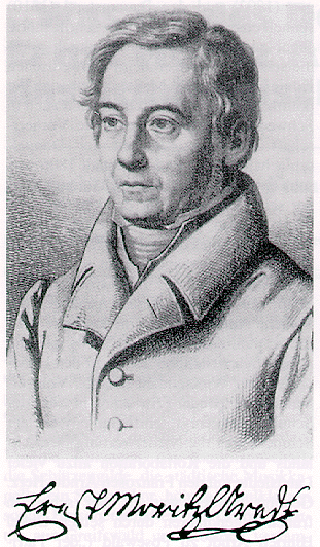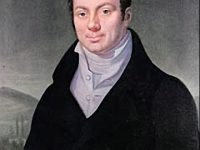
Ernst Moritz Arndt (* 26. Dezember 1769 in Groß Schoritz; † 29. Januar 1860 in Bonn)
On December 26, 1769, German nationalist historian, writer and poet Ernst Moritz Arndt was born. Early in his life, he fought for the abolition of serfdom, later against Napoleonic dominance over Germany. Arndt had to flee to Sweden for some time due to his anti-French positions. He is one of the main founders of German nationalism and the 19th century movement for German unification.
“He who does not respect and love his language cannot respect and love his people; he who does not understand his language does not understand his people, […] for in the depths of language lies all inner understanding and all the peculiarities of the people are concealed.”
– Ernst Moritz Arndt, Draft of a German society, 1814.
Ernst Moritz Arndt – Family Background
Ernst Moritz Arndt was born between the Seven Years War and the French Revolution. His father Ludwig Nikolaus Arndt (1740-1808), although he was only the son of a shepherd of the Putbus estate in Swedish Pomerania, was able to buy himself out of the serfdom of Count Malte Friedrich zu Putbus for the high sum of 80 Talers on March 28, 1769 and worked as an inspector on the Count’s estate at the time of Arndt’s birth. In 1776 his father became tenant of various estates on Rügen. His mother Friederike Wilhelmine (née Schumacher, 1747-1804), daughter of a farmer, influenced his early education significantly through folk tales and Bible stories.
Youth and Education
The father sent his freeborn son to the grammar school in Stralsund’s St. Catherine’s Monastery from February 1787 to 1789 after instruction by tutors. In autumn 1789 he was publicly praised for his successfully passed autumn examinations. However, he himself saw no more sense in learning at the grammar school, left Stralsund and went to Zemmin outside Swedish Pomerania. After the intervention of his father, who gave him the choice between continuing his studies or working on his parents’ estate in Löbnitz, Arndt returned to his parents and stayed there until Easter 1791, practically completing the Gymnasium in “correspondence courses”. From May 1791 he studied at the Universities of Greifswald and later Jena, where he studied Protestant theology, history, geography and ethnology as well as languages and natural sciences. After his time as a candidate and tutor with Ludwig Gotthard Kosegarten, he undertook an educational journey through Austria, Northern Italy, France, present-day Belgium and part of Northern Germany in 1798/1799. He described his impressions in various travel reports.
Academic Career and Political Work
In April 1800 Arndt habilitated in Greifswald in history and philology with a paper in which he spoke out against the ideas of Jean-Jacques Rousseau.[1] On 22 April 1800 Arndt asked the University of Greifswald for a teaching permit for history and philology, which was granted to him on 5 May 1800 by the Governor General and University Chancellor Hans Henrik von Essen, to whom Arndt later dedicated his attempt at a history of serfdom in Pomerania and Rügen. Arndt became a private lecturer at the university in 1801. In 1803, after the publication of his Versuch einer Geschichte der Leibeigenschaft in Pommern und Rügen (attempt at a history of serfdom in Pomerania and Rügen), he was sued by noble landowners. In it he had criticized in indignation the peasantism and serfdom in the past and present. Arndt wrote in his autobiography that the 1806 abolition of serfdom and patrimonial jurisdiction in Swedish Pomerania by the Swedish king followed from reading his study. In the same year Arndt wrote the first part of his anti-Napoleonic pamphlet Geist der Zeit (Zeitgeist). After a stay in Sweden in 1803/1804, he was granted an extraordinary professorship at the Faculty of Philosophy in Greifswald on April 11, 1806 at his request of November 1805. From the summer on Arndt worked more often for the government, which required his stay in Stralsund. There he made friends with Christian Ehrenfried Weigel, who had been working as a doctor since 1799. He clashed with a Swedish officer named Gyllensvärd, to whom he accused of anti-German statements, and duelled with him on 12 July 1806, in which he was wounded in the abdomen by a bullet from a pistol.
Antinapoleonic Efforts
After the defeat of Prussia in the battle of Jena and Auerstedt, Arndt had to flee to Sweden from Napoleon’s troops. He arrived in Stockholm on 26 December 1806, where he wrote the second part of Geist der Zeit, which was intended to show ways out of the “foreign domination of Germany”. Arndt worked in Sweden on the translation of the Swedish Code of Law so that it could be introduced in Swedish Pomerania. After the fall of King Gustav IV Adolf, Arndt left his asylum in 1809 and returned to Germany illegally. He first lived with his siblings in the country and then went to Berlin to live with Georg Andreas Reimer, where he was introduced to a patriotic circle that included Friedrich Ludwig Jahn, Hermann von Boyen, August Neidhardt von Gneisenau and Friedrich Schleiermacher. When Napoleon had forced Frederick William III of Prussia into an alliance for war against Russia in 1812, many German opponents of France went to Russia. Among them was Freiherr vom Stein, who saw in Arndt a companion in support of German national consciousness against French foreign rule and invited him to become his private secretary. Arndt followed him via Prague to Saint Petersburg. His duties included correspondence with England and Germany, especially concerning the Russian-German Legion, and a coalition of England and Russia. During this time Arndt published most of his patriotic songs and poems and his writings against France.
Students and Fraternities
At the beginning of the war of liberation Arndt wrote the writings Kurzer Katechismus für den teutschen Soldaten and Catechismus für den teutschen Kriegs- und Wehrmann (Short catechism for the German soldier and catechism for the German soldier). In this writing he castigated the “war of the tyrants”. His example of a tyrant in this writing is Napoleon Bonaparte. Among other things, this work contains eloquent descriptions of the battles fought against Napoleon. After Napoleon’s defeat in the Russian campaign and the beginning of the wars of liberation, Arndt returned to Swedish Pomerania in 1813. From the summer of 1816 to March 1817 he was in Stralsund, which had been Prussian since 1815, and met, among others, his long-time friend Gottfried Christian Mohnike, his former deputy headmaster Furchau and his son Adolf Friedrich. He continued to support the national unity movement through various writings, including Der Rhein, Deutschlands Strom, aber nicht Deutschlands Grenze (The Rhine, Germany’s river, but not Germany’s border,), in which he called for the German-speaking Rhineland to be separated from France. Arndt had a very positive attitude towards the foundation of the Urburschenschaft, which wanted to overcome the previous student compatriots in favor of a national organization. He is regarded as one of its creators, along with Jahn and the Jena professors Jakob Friedrich Fries and Karl Wilhelm Stark. In his book Studentenstaat, published in 1815, he transfigured the student way of life in antinomy to every bourgeois narrowness as “poetic freedom and equality, a self-sufficient and self-dominant life without coercion and without sin, where the immeasurable expanse of the intellectual world is open”.
Professorship in Bonn and Demagogic Activities
He went to the Rheinische Friedrich-Wilhelms-Universität in Bonn, built by Prussia, where he became professor of history in 1818. In 1819 Arndt published the poem Der Fels des Heils in his book Von dem Wort und dem Kirchenlied. Arndt’s academic work was only of short duration. In 1819 his papers were confiscated in the so-called demagogue persecutions as a result of the Carlsbad resolutions because of the fourth volume of Geist der Zeit and private statements, he himself was suspended from his teaching post on 10 November 1820. In February of the following year, proceedings for “demagogic activities” were opened against him. It ended without result. In 1826 Arndt had to resign his professorship completely. Only in 1840 he was rehabilitated by Friedrich Wilhelm IV.
Later Years
On 18 May 1848 Arndt entered the Frankfurt National Assembly as a representative for Solingen. He remained factionless, but was a member of the Imperial Delegation. The Prussian King Frederick William IV had already written to Arndt before the assembly was constituted that he would not accept the crown offered by a democratic parliament. On May 20, 1849, Arndt resigned his mandate and devoted himself again to academic life. Arndt remained active as a patriotic writer. In 1858, Hermann and Moritz Schauenburg dedicated the first edition of the Allgemeines Deutsche Kommersbuch (General German Corporate Book) to Arndt. This dedication and a facsimile of his reply are still printed in every edition of the Kommersbuch. With general public participation Arndt celebrated his 90th birthday in 1859. He died shortly afterwards on 29 January 1860.
Sir Richard J Evans – German National Identity, [7]
References and Further Reading:
- [1] “Man was born free, and he is everywhere in chains” – Jean-Jacques Rousseau, SciHi Blog
- [2] Works by or about Ernst Moritz Arndst at Wikisource
- [3] Ernst Moritz Arndt at German Digital Library
- [4] Works by or about Ernst Moritz Arndt at Internet Archive
- [5] Ernst Moritz Arndt at Library of Congress Authorities
- [6] Ernst Moritz Arndt at Wikidata
- [7] Sir Richard J Evans – German National Identity, 2014, Liverpool John Moores University @ youtube
- [8] Chisholm, Hugh, ed. (1911). “Arndt, Ernst Moritz“. Encyclopædia Britannica. Vol. 2 (11th ed.). Cambridge University Press. pp. 627–628.
- [9] Hellmuth Rössler: Arndt, Ernst Moritz. In: Neue Deutsche Biographie (NDB). Band 1, Duncker & Humblot, Berlin 1953
- [10] Gerd-Helge Vogel und Gerd Albrecht: Ernst Moritz Arndt (1769–1860). Bilder aus seinem Leben und seiner vorpommerschen Heimat während der Franzosenzeit. Ludwig Verlag, Kiel 2020.
- [11] Timeline for Ernst Moritz Arndt, via Wikidata





